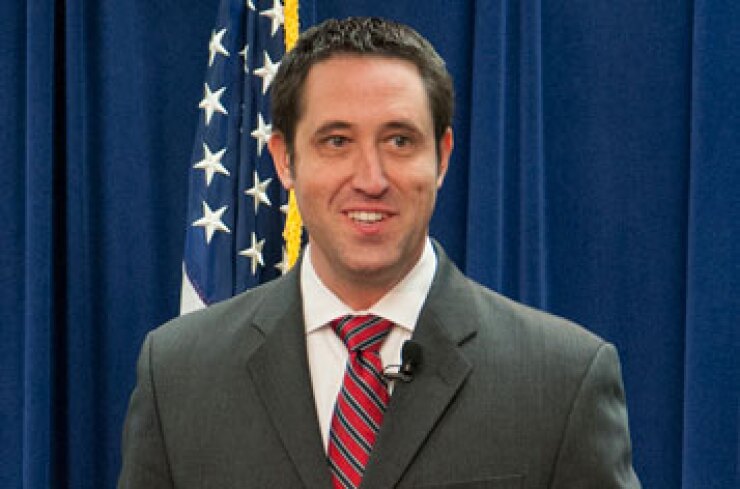
DALLAS - Texas Comptroller Glenn Hegar plans to reassure investors that the state's economy is strong enough to withstand a period of sharp energy price declines.
"There have been job losses in the oil industry in Texas as there have elsewhere in the nation," Hegar said in an interview. "But in the one month I have been in the job as Comptroller, there have been over 10,000 new jobs announced across the state."
Hegar spoke ahead of his Tuesday keynote at The Bond Buyer's Texas Public Finance Conference. The conference kicks off Monday in Austin.
Two factors that will help the state through a period of low oil prices are the state's diverse economy and a rainy day fund estimated at $8.45 billion, Hegar said. As the Legislature meets this year to draft a budget for the next two years, the rainy day fund is project to reach $11.1 billion by Aug. 30, 2017.
The fund is made up of oil and gas revenues, some of which will be diverted this year into highway spending under a plan voters approved in November as Proposition 1. Estimates are that about $1.7 billion will go toward roads.
Hegar points out that the rainy day fund, known officially as the "Economic Stabilization Fund," was a product of the 1980s oil crash that proved so devastating to the Texas economy.
"The concept behind the fund was to try to harness this naturally occurring volatility in the energy sector and use it to the state's advantage," he said.
Hegar projects the price of oil for the fiscal year that runs through Aug. 30 at $65 per barrel. Although the futures price of West Texas Intermediate crude is already below that, the prices are based on averages over time.
While oil fell by more than 50% from more than $100 in July, the actual average for August through December was $80, according to the state's chief accountant.
Starting from $80, the price is expected to drift lower to an average of $65 over the next seven months, Hegar said.
"In Texas, yes a lot of focus has been on oil prices and rightfully so," Hegar said. "This week, people have been asking me if I lose sleep over oil prices, and the answer last week would have been obviously yes."
Sherri Greenberg, a professor specializing at public finance at the Lyndon B. Johnson School of Public Affairs at the University of Texas, said that Hegar's toughest job will be trying to stay ahead of the price of oil.
"Members of the legislature will be looking to see what's happening here with the price of oil and what that means for the rainy day fund and what that means to parts of the state where they are more dependent on fracking," Greenberg said.
"There have been comptrollers who have had harder jobs," she said. "In this situation, we're not in the midst of a recession. The difficulty here is trying to peg the dollar cost of oil."
Houston Controller Ronald Green said the lower oil prices are no cause for panic and could offer some benefits such as lower costs for fueling police, fire and sanitation vehicles.
"Everybody's worried about the $43 per barrel oil, and I think you'll see some layoffs," Green said. "But I think with all the healthcare and tech industry in Houston, it will stabilize."
Despite layoffs and mergers in the nation's oil capital, commercial and residential building permits are still rising in Houston, Green said. Since Green's comments, oil has risen to around $50 per barrel.
"I'm cautioning my fellow CFOs across the country, don't pencil in $43 per barrel oil in your budget," Green said.
Noe Hinojosa Jr., chief executive and founder of the Dallas-based municipal advisory firm Estrada Hinojosa & Co., said the state is capable of handling volatility after a surge in oil production over the past two years. Noting that hydraulic fracturing of tight shale formations is a new science, Hinojosa said the business cycles of the industry must be redefined.
"You're going to find in any boom your highs and your lows," he said. "There are some countries out there that wish we would shut down everything. What's nice is that we're able to play in a field where we previously weren't able to play. Now, we're kind of a market stabilizer."
Another conference speaker whose new job focuses heavily on business is Carlos Cascos, the county judge of Cameron County designated as Gov. Greg Abbott's new Secretary of State.
Cascos, the chief presiding officer in the southernmost county of Texas, is awaiting confirmation in the Texas Senate. Once confirmed, he will manage statewide elections, deal with business issues and trade relations with Mexico.
"In 2014, the Texas Secretary of State's office received filings for 157,225 new businesses," Cascos said. "This is an 11.69% increase compared to 2013. In fact, the state has seen consistent year-over-year growth in the number of business filings for the last five years."
The Texas Public Finance Conference continues through Wednesday.





